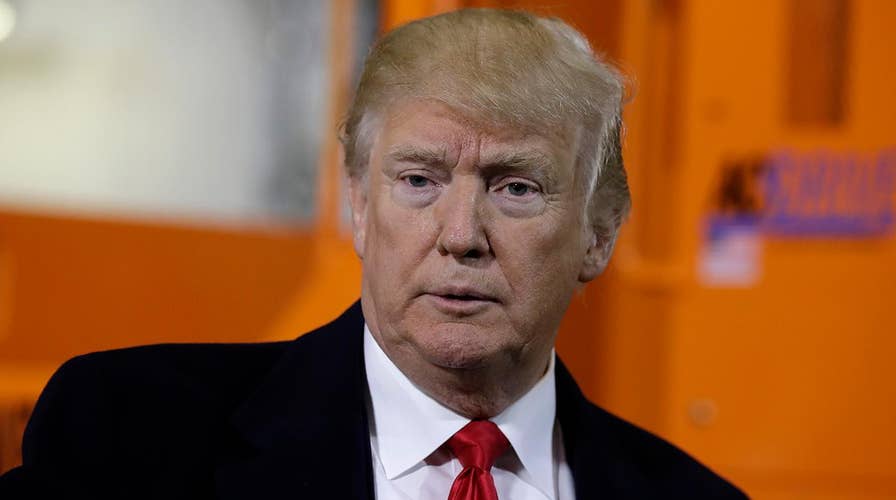Trump: Tax cuts working bigger, quicker than we expected
President tours Pennsylvania equipment plant before speech on taxes and the economy.
Not that they needed one, but progressive wing nuts and their fellow travelers are getting another reason to hate President Trump. He’s proving that capitalism works.
The president’s policies of cutting high taxes and excessive regulations are sparking a stock market surge and soaring economic confidence.
Each day brings announcements from companies ranging from Apple to Walmart that they are giving bonuses and pay hikes, adding new jobs and increasing their investments in America.
Millions of workers will get the bonuses, most of which are for $1,000, and untold others will get new or higher-paying jobs.
Most of those workers also will see their take-home pay increase because they will get personal income tax cuts and a doubling of the standard deduction. Those changes will become apparent in a week or so when the new lower rates are applied to payrolls.
The cash-in-the-pocket benefits are great news to many families, but the boom is doing something else too: It’s giving the millennials a firsthand lesson in economics.
It’s hard not to conclude that Pelosi and her elitist ilk believe ever-higher taxes and redistribution are superior to growth fueled by the private sector. And that handouts are better than jobs.
Following eight slow-growth years under President Barack Obama and an election where their favorite candidate, Bernie Sanders, railed against the wealthy and promised free stuff for everybody else, many young Americans were taught that socialism is their friend and capitalism their enemy.
Now they are getting proof that the opposite is true. They are eyewitnesses as capitalism provides more opportunities and financial security to more people than any other system.
If they still have doubts, they need only ask their parents about their swelling 401(k) and IRA accounts as a result of the Dow Jones’ 45 percent climb since Trump’s election.
All Democrats voted against the tax cuts and some refuse to celebrate the good results. House Minority Leader Nancy Pelosi called the bonuses “crumbs” and likened them to cheese on a mouse trap. Former party boss Debbie Wasserman Schultz told a crowd that “I’m not sure that $1,000 goes very far for almost anyone.”
It’s hard not to conclude that Pelosi and her elitist ilk believe ever-higher taxes and redistribution are superior to growth fueled by the private sector. And that handouts are better than jobs. As Friedrich Hayek explained, central planners are always paving “The Road to Serfdom.”
In fact, government redistribution had its heyday under Obama, who raised taxes on upper incomes yet never stopped complaining that the rich didn’t pay their “fair share.”
He also piled up restrictions on business through environmental rules, ObamaCare and the Department of Labor, not to mention Dodd-Frank.
Those burdens strangled growth, both in terms of take-home pay and job creation. Obama was the first president never to have a whole year of 3 percent growth and had the lowest labor-participation rate in three decades.
The former president revealed his gut view of capitalism in a 2012 speech when he famously declared, “If you’ve got a business, you didn’t build that . . . somebody else made that happen.”
His point was that government built the roads, etc., which is obviously true, but misses the point that government has no money of its own.
It has to take it from the private sector, and when it takes too much, people pay the price through lost jobs and opportunity.
The contrast with Trump is striking. His “America is Open for Business” spiel at Davos was consistent with his promise to get the economy roaring. Never a shrinking violet, he is most convincingly authentic when cheerleading for jobs, jobs, jobs.
He starts his second year in office with the dividends piling up. As The Wall Street Journal reported Friday, the tax cuts are “rippling through” the economy and leading all kinds of firms to explore expansion and some to consider new plants and acquisitions.
Many companies also are increasing their charitable contributions, with JPMorgan Chase saying it will boost its community-based philanthropy by 40 percent, to $1.75 billion over five years. That, too, is unique to capitalism — people and businesses freely giving away their money.
According to the Journal, profits for most firms in the S&P 500 could rise by 7 to 8 percent per share, which is why they will spend more. That spending will lead to higher earnings for other companies as part of what one analyst called a “virtuous cycle.”
No one knows how far the expansion will go or how long it will last. But one thing is certain: Trump is the catalyst.
No other Republican who sought the presidency in 2016 had comparable plans to reduce regulations and taxes. And Democrat Hillary Clinton promised more of both while trying to match Sanders’ free-stuff promises.
The economy will figure heavily in the midterm elections, but won’t be the only factor. National security will matter and special counsel Robert Mueller’s investigation could have a huge impact.
But for now, the rising tide of capitalism is lifting all boats. Just as it always does when given a chance.
To read more Michael Goodwin on the New York Post click here.









































